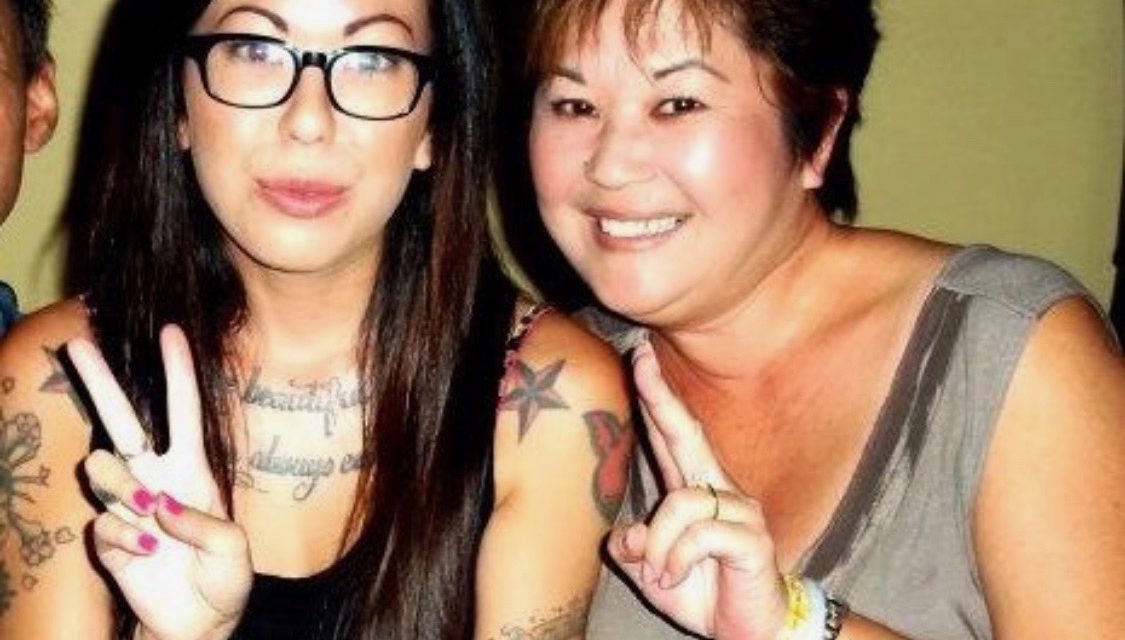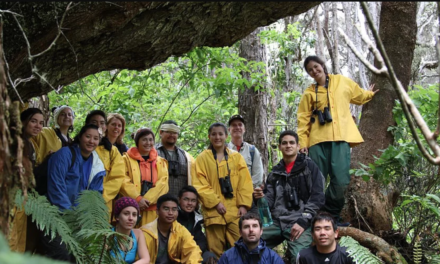By Katlin Cilliers | Staff Writer
It all started when Shanelle Borges was 13.
Back then, resorting to drugs and alcohol was the way she found to escape reality, to make herself feel better. From alcohol abuse to becoming an IV drug user of methamphetamine on the streets of Waikīkī, Borges’ life has been far from smooth. Through her teenage and early adult years, she made choices that took her around the world – from Hawai‘i to Los Angeles, to partying in Germany, to living on the streets of Waikīkī. She has gathered bittersweet experiences along the way.
A week before turning 34, Borges recalled her journey battling addiction and leaving homelessness, which culminated with a new chapter in her life, marked by her pursuit of an Associate in Arts degree at Kapiʻolani Community College. Eventually, she hopes to transfer to the University of Hawaiʻi at Mānoa and become a social worker.
“I know today that that happened, so I can give to somebody – maybe anyone – that’s experiencing this pain that I was going through,” she said in late February. “So that’s why I got into social work. … I don’t know what I’m doing, but I’m just gonna stick with it. And I’m here today. I’ve been here [at KCC] for two and a half years, and I am still kicking. And I have really cool people in my life today. I have really awesome sober sisters and school friends. I don’t know what I’d do without like, therapists and case workers, and I just feel really blessed.”
Addiction drove Borges to take actions she now regrets, such as taking from her family to sustain her dependence. Around 2008, she went to Germany with a boyfriend for six months. Upon her return – after leaving the abusive relationship – Borges decided to live on the streets, where she’d imagined her life would be free of pressures and accountability. At age 27, she found herself completely cut off from her loved ones, living on the streets of Waikīkī. It was all about surviving.
“It was just total survival at that point,” she said. “I was sleeping on the sidewalk, I was sleeping in these mountains, I was sleeping on the beach, … and I was stealing to support my meth habit.”
Her years on the streets included being in and out of jail at any given time. In one of these occasions, while she was in O‘ahu Community Correctional Facility, the hospital told the police that Borges’ blood work had come back positive. She was three months pregnant. The discovery shook her out of what she describes as “many layers of denial.”
She was released from jail and soon back on the streets. Only this time she was pregnant. In December 2013, she gave birth to a 5-pound, 11-ounce baby girl at Kapi‘olani Medical Center for Women and Children.
“Bela was, and still is, the most beautiful and splendid human I have ever met. I fell in love with her immediately,” Borges said of her now 4-year-old.
No methamphetamine was traced in the baby’s blood, so Borges and her boyfriend, Felix, were able to keep the child. A few days later that month, the three of them were back on the streets.

Borges’ daughter, Bela, was born in December 2013, while she lived on the streets of Waikīkī. “Bela was, and still is, the most beautiful and splendid human I have ever met. I fell in love with her immediately,” Borges said. (Photo courtesy of Shanelle Borges)
“We left the hospital to go be homeless again. With a brand new baby, so it really wasn’t good,” she said. “But everything happened the way it was supposed to happen, I believe, today.”
The young family lived in a hostel in Waikīkī, sharing the facilities with fellow addicts, drug dealers and travelers.
“That’s really hard for me to look at today,” she said, her voice shaking as she remembered those times. “But it’s getting better and better, just that peace of forgiving myself because we are healthy and we’re OK.”
On February 19, 2014, Borges had a court hearing due to a police altercation and her previous incarceration. Though she said that she would’ve normally avoided that situation, she stood in front of the judge and accepted his decision to put her in custody for three months. Borges broke down in tears. She had a meltdown in court when she realized she was going to be taken away from her 2-month-old.
Borges had finally hit her “rock bottom.” While she was in prison, her boyfriend lost custody of the baby after the two of them were reported sleeping in a park. Child Protection Services sent a notice to Borges, whose health plummeted as her weight fell below 100 pounds.
From then on, she could only see her daughter for limited amounts of time, when Bela was brought to the correctional facility by her foster caregivers. Borges broke out in tears when she recalled the first time she saw her child in April 2014, two months after they’d been separated.
“She grew so much, it was crazy,” Borges said. “I didn’t even recognize her at first, but it was just like, she just grew, she was so healthy. … I felt really grateful that she was in a safe place and that they would come and bring her.”
In prison, she didn’t know how to regain custody of her child. Her fellow inmates suggested that she sought help from drug treatment facilities. Borges started by writing a letter to Women’s Way, a treatment center managed by Salvation Army. Less than a month later, she was admitted with what she calls “the golden ticket,” since the acceptance documents came in an orange envelope.
In May 2014, Borges was summoned to the courthouse to be sentenced. She was told that because she’d written to Women’s Way and expressed the desire to get into rehab, the judge wouldn’t give her time. Instead, she would go on probation, under the conditions that she’d get a certificate from a residential treatment facility.
That was the beginning of her journey to recovery; she was then picked up from prison and taken to Women’s Way, where three weeks later she reunited with her daughter.
Upon recalling the most remarkable moments in the treatment center, Borges said that learning “how to be a mom” stuck with her. She’d never had the chance to experience being a mother and care for a baby in terms of nutritional needs, parenting and other simple tasks.
“And then we all learned from each other, as women, and that was really huge,” she said.
After the five-month period, she went to another facility managed by Salvation Army, called Ke Ola Pono, for six months. At that time, she still had hints of defiance in her, and she resisted being told what to do. Now, she is immensely grateful for the support she got from counselors and case workers, who guided her in her daily struggles.
From there, she and Bela moved to a transitional house in Mānoa, where they stayed for 18 months. Someone then suggested that she go to school; she hesitated at first. But she took one step at a time, even when it all seemed unclear. She pushed self-defeating thoughts to the side and kept moving forward.
“Without [my support systems] … I don’t have anything else,” Borges said. “That is what I work on each day. That is what keeps me going.”
Borges has been working on shifting her mindset, from her own negative self-talk to the way she relates to her loved ones. She sees certain past experiences and situations through healthier lenses. Her mother Cindy said she is “very proud of her daughter.” She and Borges have been working on re-establishing mutual trust and are now in a much better space as mother and daughter. Cindy takes care of her granddaughter on weekends, allowing Borges to have some time for herself. Bela and her grandmother adore each other.
In August, 2015, Borges started working on her general education courses at KCC. She started off with four classes and has been making academic progress ever since. She feels that she could make a difference with social work.
“What happened to me, it didn’t happen to me, it happened for me,” Borges said. “I am totally not a victim of my circumstance. I just really feel like, because of all of that, I really know what I want to do.”
This May, Borges will be off probation after four years.







Wow!!! What an inspiring article! Shanelle is going to make a huge impact on the field of social work someday. Beautifully written!
Wonderful story of redemption and achievement. Nicely told!
Inspiring story. Thank you.
Thank you, Katlin, for writing this sobering and motivational story. So glad Shanelle had the opportunity to describe her journey to you and that you are sharing it with others. I wish her the very best. Everyone she meets at KapCC will be part of a large support network that will help her, support her, and applaud her when she graduates and completes her degree. Mahalo.